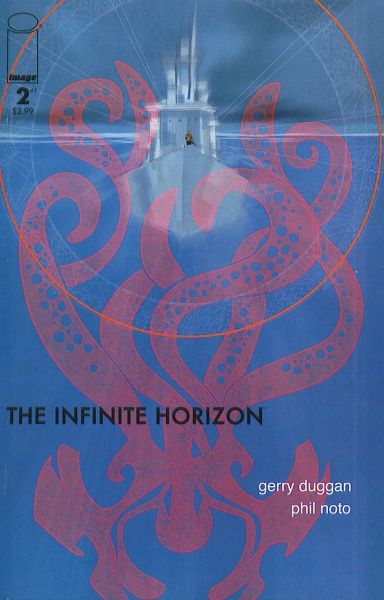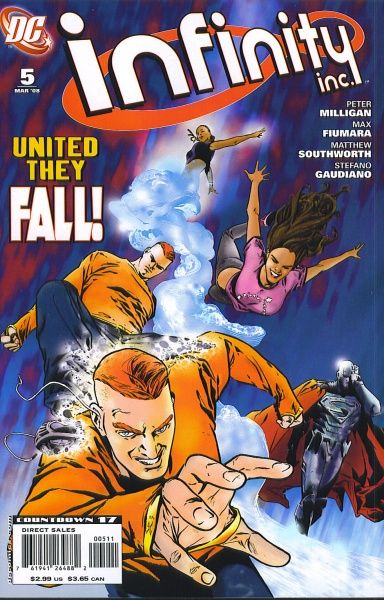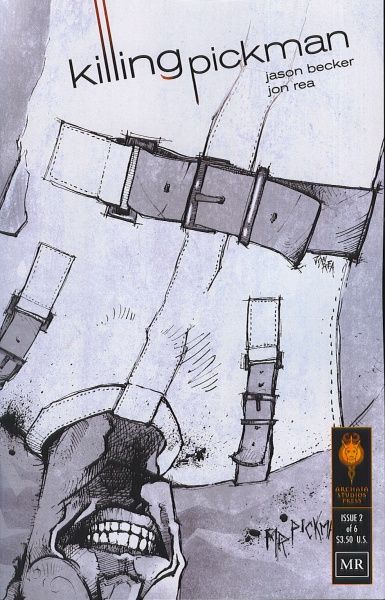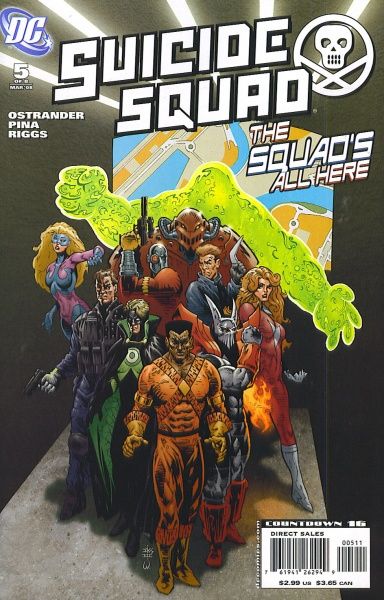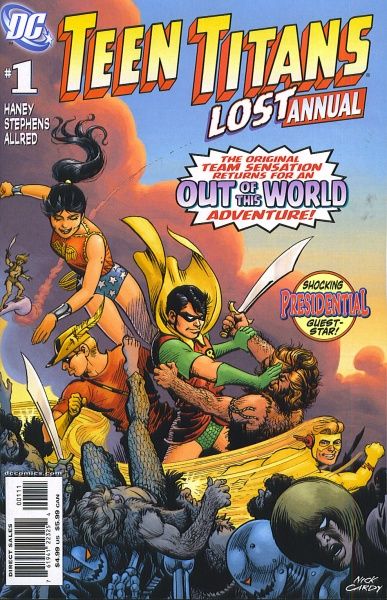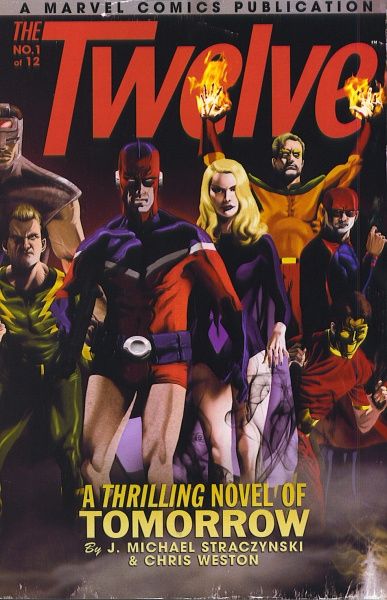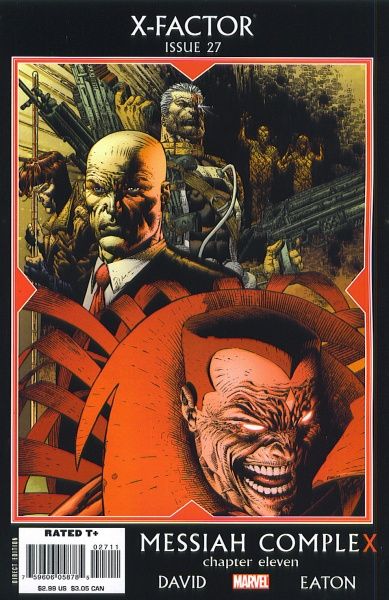It was a small week for me, so I decided to check out some of the higher-profile comics coming out. Unfortunately, not unlike a certain green (red?)-skinned goliath, this just made me angry. Man, I just know these comics are going to sell through the roof. Please, please, please don't buy them! Please! Read them for free if you must, like I did, but don't pay hard-earned money for them!
First, check out the credits of each book. Can we get a ruling on how to spell "pencil[l]er"? Marvel spells it with one "l" and DC spells it with two. Oh, the spelling drama! Second, Marvel lists the colorist first, while DC lists the letterer first. Are we heading toward a higher-up credit war between those two fine contributors to your comic book product? Stay tuned!
Amazing Spider-Man #546 by (wait for it!) Dan Slott (writer), Steve McNiven (penciler), Dexter Vines (inker), Morry Hollowell (colorist), and Cory Petit (letterer). Back-up stories by Marc Guggenheim (writer), Greg Land (penciler), Jay Leisten (inker), Justin Ponsor (colorist), and Petit; Bob Gale (writer), Phil Winslade (artist), Chris Chuckry (colorist), and Petit. $3.99, Marvel.
Well, well, well. It's a Spider-Man story, written by Gerry Conway and drawn by Ross Andru! Who'da thunk it?
Oh, all right. It's not by the team supreme of Conway and Andru. But just for fun, I opened Essential Spider-Man, volume 7, totally at random and came upon Amazing Spider-Man #146. How does it stack up to this latest issue?
Let's see ... strange villain with a mysterious agenda? Check. The Jackal begins the old issue, while the Negative Man shows up in the middle of #546, but they both have something mysterious going on. That's not to say that a lot of comics don't have villains with mysterious agendas, but still.
Okay, what about girl trouble? That's what "we" all want, right? (And by "we," I mean everyone who works for Marvel and loves writing Three's Company-esque situations where Peter has two dates on the same night, plus the Vulture is in town! That's real drama, people!) Well, in the modern day, there's a mysterious girl with an agenda - wait, two people with mysterious agendas in the same issue? - who wants to hook up with Peter so she can join the "Osborn Entourage" and then dump Peter and move up to Harry. Oh, and some shy bookworm girl who wears glasses and piles her hair on top of her head in the classic "hot girl who wants to look bookish" style we know and love from such great Freddie Prinz Jr. movies like She's All That. Gosh, I wonder if she'll take those glasses off and shake her hair out in some tender moment with Peter, causing his heart to leap with love? In #146, it's Gwen Stacy. But isn't she dead? Well, yes, but she's back, baby! But does Peter love her? Well, no, because there's "another girl" he's "grown to care about." Unfortunately, none of us can quite remember her name. Did Marvel put something in our water to wipe out our memory?
How about regular, non-mysterious bad guys? In #146, Peter decides to clear his head of the girl trouble by swinging around, breaking into the Scorpion's apartment, and reporting his latest crime to the police. Here in the now, Peter gets mugged in an alley by someone wearing a Spider-Man mask and, when he gives chase, is distracted when the man runs into a soup kitchen. We'll get back to that!
And of course, what about Aunt May? Weirdly enough, in issue #146, Conway introduces May thusly: "our erstwhile hero momentarily abandons his search [for the Scorpion] to visit a certain elderly relative staying in a midtown hospital ... the immortal old woman known as Aunt May ... (my italics)" First, when is that woman not in the hospital? Second, how did Conway know about her immortality? I mean, she has to be immortal now, right? That's Mephisto's curse, right: That she'll outlast everyone in the world, and eventually go mano-a-mano with the Hulk in a Peter David/Dale Keown crossover: Hulk/May Parker: The End! The Scorpion busts in, yells at Aunt May (he was told Spider-Man would be there, but all he sees is this "old bag" and a punk kid), and gets into a fight with Spider-Man after Peter ducks out of the room. The rest of the issue is the fight, but at the end, Spider-Man forces the Scorpion to apologize to May, who gives him a tongue-lashing (she even tells him she'll bitch-slap him if he doesn't watch his mouth - May is awesome).
Meanwhile, in #546, Peter chases the mugger into a soup kitchen, which happens to be where May volunteers to escape the loneliness of the fact that the only significant man in her life is her layabout nephew (seriously, let May have a real romance, Joey Q - she's already old, so it won't seem like she's "too old" for it, plus think of all the story possibilities when her new beau tells her layabout nephew to get off his ass and get a real job!). The head honcho at the shelter, some millionaire dude, of course thinks that Peter is homeless, because he got beat up a bit by the mugger and he's not wearing any shoes (he started to change into Spider-Man, but decided to take care of the bad guy Parker-style!). Of course, because it's "funny," Jack Tripper - I mean Peter - can't get a word in to explain why he's not homeless, and millionaire businessman makes him feel all guilty because there are people in the world with real problems. You know, I missed the Spidey guilt trips he always goes on, but it's back! Because it's "real."
Oh, and then Peter goes to the Bugle to demand his money from JJJ, who is trying to save the Bugle from a hostile takeover and whose employees are all working for free until he does so (obviously, the Marvel U. is not ours, because there's no rent that people need to pay in this Manhattan), and he yells at the old blowhard, who has a heart attack. More guilt for Peter! ("Years of cigar-smoking and poor diet didn't give Jonah the heart attack, it was my callous demands for money I had rightfully earned! Oh, if only I had a trust fund like Betty and everyone else who works at the Bugle, so I could forego my salary and play the newspaper game in between regattas! But no - I had to be selfish and give that great American coronary artery disease!")
Sigh. It's not that this is a horrible book. It looks very nice, and Slott does an okay job setting up Peter's new reality (plus, the Negative Man is kind of cool). It's just that, with a few tweaks, this could have easily been published in 1975, when issue #146 came out. It's Peter with job problems, girl problems, Aunt May problems, super-villain problems, J. Jonah Jameson problems ... we've seen it all before. If that's your thing, you'll probably like this. But I got bored with that a long time ago. I guess it makes Joey Q happy, so that's all that really matters. Joey Q was 12 in 1975. So he probably went into a five-and-dime, gave the clerk a dollar, got some Bazooka bubble gum, a copy of Amazing Spider-Man #146, and change, then sat down on the curb to leaf through the poorly-printed pages before, I imagine, throwing it away (or at least stuffing it into a backpack, taking it home, throwing it in the closet, and forgetting about it for a few months until his mom told him to clean up, and when he didn't, she threw it away and he never noticed). Hey, that's great, Joey Q. You know what would make me interested in revisiting those glory days of 30 freakin' years ago? How about you make your new Spider-Man cost 25 cents and print it on the same crappy paper? Then maybe the kids would buy it. This costs 4 dollars, and issues come out twice more this month? Are they all going to be 4 dollars? No kid wants to drop 12 bucks a month on something like this!
Double sigh. I'm ranting too much, and I still have a lot of ranting to go. Like I said, it's a perfectly serviceable Spider-Man story. If that's your thing, enjoy it. I'll be reading something else.
Hulk #1 by Jeph Loeb (writer), Ed McGuinness (penciler), Dexter Vines (inker), Jason Keith (colorist), and Comicraft (lettering). $2.99, Marvel.
Damning with faint praise, I will say this is a lot better than Loeb's most recent offering, the "argument-for-book-burning" Ultimates 3 #1. Of course, that doesn't mean it's really all that good. Loeb likes setting up intriguing mysteries without really pulling them off (see: The Long Halloween and Dark Victory), and in this issue, we get an unusual one: the Hulk has apparently killed the Abomination, but Bruce Banner, as we know, is chilling his heels in Nevada prison. Whaaaaaa? So who killed Emil Blonsky?
Loeb actually begins this issue very well, with Leonard Samson and She-Hulk head to a Russian village and investigate the murder. Samson reconstructs it with Jennifer, and as he does, opposing panels on the page show it actually happening in flashback. It's a very nice device. Later, the supposedly dead Rick Jones shows up in Alaska, so there's that. And we end with Samson and General Ross visiting Bruce, who seems to know quite a bit about what's going on, even though he's in prison. Ah, the mystery!
Of course, because this is a Loeb comic, and a Marvel superhero comic to boot, we get idiocy. Ross, Maria Hill, and Iron Man are all hanging out with Samson and Jen in Russia, and as they're about to take Blonsky's body, the Winter Guard shows up. The Winter Guard, of course, are a bunch of Russian super-heroes, and they'll be damned if they let those capitalist pig Americans take a Hero of the Motherland like Blonsky away! The two sides discuss things, each side getting angrier, until the psychiatrist, Leonard Samson, takes a swipe at Red Guardian ... for no real reason. Well, okay, a real reason - it's a Marvel comic, and we need a big fight, consarnit! So they fight for awhile, and it's as boring as you might expect, and then General Ross uncovers a young survivor, who keeps repeating "red." Oooh, a clue!
The issue is okay, I guess. It's dumb, but mildly entertaining. Based on Loeb's track record, it will go downhill quickly from even this marginal beginning. A few things bother me, beyond that awful cover. On one page, Samson appears to strike Jennifer (well, not really, but he shows how a punch was thrown) with his left hand on her left cheek. He's standing in front of her, so I have no idea how he's able to do that. The Hulk uses a gun to kill Blonsky, and Ross is incredulous. "Since when does THE HULK use a gun?" he rants. I'm not surprised Ross doesn't know that the Hulk has used a gun in the past, but someone should have. And I guess Samson's hair doesn't need to be long anymore for him to possess strength, because he has a short 'do. I know that's no longer the case, but when did it happen?
Those are just minor complaints. Mostly, this is a competent issue with 4-5 pages of stupid filler (the fight) that does nothing to hold my interest. Maybe - maybe - if it were by a writer I trusted more, I might get another issue, but I doubt if this will get any better, and it's just okay as it is.
The Infinite Horizon #2 (of 6) by Gerry Duggan (writer), Phil Noto (artist), and Ed Dukeshire (letterer). $2.99, Image.
Duggan's re-imagining of The Odyssey works better this issue than last, because he puts aside the polemics and concentrates on the story, and it's a good one. We do get a little bit from the Captain's wife back in the States, as she shows the steely resolve of Homer's Penelope, but mostly we focus on the Captain and his band of soldiers, who have secured a boat and are trying to cross the Mediterranean when they are accosted by pirates. As you can probably guess, things don't go well. They do, however, end up on an island, where things get even worse. Man, it sucks to be them.
There's not much to say about the actual story, because this is just solid plotting as we move along, narrated by the Captain after his voyage is over and he can look back on the entire thing. This lends some depth to the proceedings, because he is able to second-guess his decisions, even though at the time, they seem like the only decisions he can make. It gives us an idea of the absolutely untenable position he's in. Noto's art is very good, although he often struggles a bit with more dynamic panels, and in this book, he needs to work in some more action, so it's not as good as it could be. Still, it's a nice-looking comic.
We'll see how it plays out, but right now it's a good comic with a lot of potential.
Infinity Inc. #5 by Peter Milligan (writer), Max Fiumara (penciller), Matthew Southworth (inker), Travis Lanham (letterer), and Dom Regan (colorist). Back-up story by Milligan, Southworth (penciller), Stefano Gaudiano (inker), Lanham, and Regan. $2.99, DC.
In keeping with my attempts to cull my pull list, I think I'm done with this title. After an excellent first issue, it seems like Milligan is just spinning his wheels, and I wanted to see how this first story arc ended up before deciding about it. Well, the first story arc is done, and it doesn't feel like he's accomplished very much with a solid concept while drawing out a story that probably should have been three issues tops. In the end, this is just another superhero book, and I already read too many of those.
It's not as if this is "bad" Milligan or anything. Even at his best, Milligan has a strange detached feel about him, and this is heightened in this book, which is about people who are out of touch with their feelings. I can deal with that, but it doesn't seem like Milligan has anything interesting to say about the characters, and that makes the oddness of the writing style harder to take. The book is all over the map, and nothing is so compelling it makes the rest bearable. This isn't a bad comic, but it's just not worth the time. Too bad - that first issue promised so much more.
Killing Pickman #2 (of 6) by Jason Becker (writer), Jon Rea (artist), and Matt Talbot (letterer). $3.50, Archaia Studios Press.
Jason Becker sent me a .pdf file of this issue months ago, and I was planning on reviewing it the day before the issue came out to remind you to look for it. However, it never showed up on the schedule, so I never reviewed it. Now, it showed up and took me by surprise, so I'll just do it after the fact. I do appreciate Becker sending it to me, though!
I certainly won't fault people for waiting for the trade on Archaia books, because, despite their quality, they have fallen far behind a normal schedule, and it's frustrating waiting for them. Added to that is the fact that Becker, in this instance, is obviously writing for the trade, so it makes single issues a bit harder to take. In issue #1, we got the whole set-up: William Zhu captures a serial killer named Richard Pickman, and what he sees makes him decide to, as the title says, kill him. So in this issue we get Pickman speaking to a psychiatrist who has to detemine whether he's fit to stand trial, and we get Zhu plotting to kill him. However, in the middle of the issue, we get a "two months later" tag and Zhu is dealing with a hostage situation, telling his wife he's taking a less dangerous job, and then hearing about something horrible happening in Pickman's basement, which leads to the next issue. It's a very disjointed issue, because not only do we make that time jump, but right before the jump, Zhu is standing in front of Pickman's door, ready to enter, while another cop begs him to stop. It's a weird way to pause and then jump ahead. I know why Becker did it - to keep us guessing as to whether Zhu actually kills Pickman or not - but the way he writes the scene is odd. All will be explained, I imagine, in subsequent issues, but this is a strange chapter to deal with individually. I can't even say it's all that intriguing, because Pickman appears to be, as the psychiatrist says, "just another pseudo-intellectual religious nut with delusions of grandeur." At the end of the book, we get a hint that he's not, but nothing in this particular issue makes us think he's anything more than a horrible serial killer and Zhu is anything more than a cop on the edge. We've seen this kind of thing before, right?
Despite that, I'm intrigued, because the ads for the book promise more. I want to see what has happened at Pickman's house. I want to see what happened when Zhu went into his room (if, in fact, he did). And I want to see more of Rea's art, because it's very neat. He's influenced fairly obviously by Sienkiewicz, to the point of writing labels to certain things in the art, and he signs his name to individual drawings far too often (in at least five panels, including the cover), and his figures are occasionally stiff because he hasn't mastered fluidity yet, but it has a very creepy feel to it, almost like a stop-action horror film, and lends a bizarre atmosphere to the whole book. Rea has some work to do (so does Becker, for that matter), but this book can go in some very interesting ways, so I'm going to stick around to see what they are.
Of course, I still can't blame you if you wait for the trade. I'll let you know how it turns out and if it's worth it!
Suicide Squad #5 (of eight) by John Ostrander (writer), Javier Pina (penciller), Robin Riggs (inker), Rob Leigh (letterer), and Jason Wright (colorist). $2.99, DC.
So it's the fifth issue of an eight-issue story, so either you're already in and you don't care what I think, or you're not in at all and don't care what I think. Of course, there's always the possibility that you never care what I think, but that's too horrifying an idea to contemplate!
I will say that once again, we have an evil corporation, because in comics, all corporations are evil. This is Ostrander's way of sticking it to Halliburton (Haake-Bruton in the book), and he does at least attempt to show how you can "kill" a corporation. As usual, I'm not saying these writers are wrong - I'm as angered by global conglomerates as the next guy, unless the next guy is T., who probably loves them (I'm just funnin' with you, T.!) - but it's tiring to never hear about any good companies in comics. I'm flogging a dead horse, though, so I'll get to the heart of the issue (which may or may not contain SPOILERS, depending on how much you trust a crazy general in an indestructible body).
Ostrander is quite good at writing these kinds of things, in which a tale plays out with surprises but no shocks, because everyone who's been reading has been expecting General Eiling to attempt some kind of double-cross. When Flag went into Eiling's room by himself, I thought to myself, "Uh oh." Come on - of course Eiling would have some kind of fail-safe built into Flag! At the same time, of course Waller knows about the general's plot, or at least suspects it. Ostrander, however, still builds tension with the idea that Eiling will pull a fast one on Amanda, even though we know she's not going to be taken by surprise. Ostrander is a good enough writer that he doesn't need to rely on the "big reveal" to make his stories interesting - we can guess what will happen in this mini-series, to a somewhat accurate degree, but it's extremely entertaining nevertheless. Ostrander is just concerned with telling good stories. Wow, what a concept.
Teen Titans Lost Annual #1 by Bob Haney (writer), Jay Stephens (penciller), Mike Allred (inker), Laura Allred (colorist), and Gasper [sic?] Saladino (letterer). $4.99, DC.
I don't want to speak ill of the dead, and I'm sure Bob Haney was a swell guy who never even considered kicking a puppy, but this comic book is awful. It's awful on a lot of levels, and insulting on a few. Really. Really. Awful.
I'm going to ignore Jay Stephens' and Mike Allred's goofy pop art, because it's fine and evokes the era in which the story takes place, the early 1960s. It's fine. It covers a lot of the awfulness of the story, but doesn't redeem the book. This isn't about the art!
The story is horrible. Haney has the pretentious, mind-bogglingly annoying argot of 1960s comics down pat, with the opening page asking each Titan: "Whither goest thou?" (I wish I was joking) before launching into descriptions of each that would make Stan Lee ask him to tone it down: "The lithe and livid Lothario of the ultra-taut bowstring, the epitome of accuracy with any kind of arrow ...!!" That's Speedy, by the way. This continues throughout the book, and it's a hefty comic, so be warned. Of course, that's not that big a deal. It's fun, right? It reminds us a time when comics were innocent and full of joy and hope for the future, right? Well, yes. The writing style doesn't bother me all that much. I'm trying to ease into this.
Okay, Robin gathers the Titans to announce that President Kennedy has been kidnapped. Yes, he's the "shocking Presidential guest-star" promised on the cover. When I saw that, my heart dropped a little. President Kennedy, as we all know, is a hero to liberals everywhere, and in this industry, if it isn't written by Chuck Dixon and drawn by Mike Miller, it's written by a liberal. And, it's a comic book, so once I saw that, I knew we would get "JFK - action hero to the oppressed!" out of this story. Again, if Haney could pull it off, that's fine, but it didn't bode well. Plus, Kennedy didn't exactly have a happy ending, so I wondered what would happen with that.
Robin explains that he was interviewing Kennedy for a Titans magazine, but it was late in the day, so Kennedy told him to sleep in the Lincoln bedroom (Kennedy wasn't using it himself to screw starlets? how odd) and they'd continue in the morning. Robin felt a "strange aura permeating the entire wing of the White House," but it was his "protective coating" in his costume that saved him. Again, it's a 1960s comic (or wants to be), so I'll ignore the illogic of that. He went downstairs and saw ... mod hipsters kidnapping the president and substituting a shape-shifter in his place! Worse ... alien mod hipsters from the planet Ullustro! The next day, Robin doesn't know who would believe his story, so he tells the Titans. He also asks them to go to Ullustro to rescue the "hero to this country," and of course, they do! Aqualad (who gets very few lines in this comic, and usually is looking around comically like he'd rather be somewhere else) sets the coordinates to Ullustro in the "galacti-porter" (which can be yours for three easy payments of $39.99, plus you get the "protective coating" free, a 50-dollar value!) and the Titans are off, "across billions of miles, through light-years of space!"
So they land on Ullustro and convince the mod hipsters that they come in peace and they just want to know why Kennedy was kidnapped. One of the Beatles takes them to Gwynnet, the ruler of the Ullustrian, who turns out to be a brain attached to fake eyes and lips. Kid Flash says, "These people here evidently worship him!" and Robin, in a hilarious line, says, "I think we'd better do the same! Bow down Titans ... show some respect!" Good job, Robin, selling out like that! Let's put Robin in Guyana in the late 1970s - "These people here evidently worship Jim Jones!" "I think we'd better do the same! Bow down Titans ... have some Kool-Aid!" As the Titans symbolically fellate Gwynnet and sell out their own, Christian God (or whatever false deities Wonder Girl worships), we learn that the Ullustrians are in constant warfare with the other intelligent species on the planet, the Violators, who are the hairy-chested love god hippies to the Ullustrians' Warhol-esque kind.
I wonder if the Violators will turn out to be not that bad. I wonder if the Titans will realize that in this war, nobody wins! And I wonder if Kennedy, whom Gwynnet claims is the only leader who can win the endless war, will also realize that in this war, nobody wins! (The Violators obviously aren't Southeast Asian Communists, so Kennedy and the Titans shouldn't fight this war!) Luckily, those life lessons will have to wait, because the Violators, with their groovy permed hair, their headbands, and their patchouli bags hanging from their necks (again, I wish I was joking), suddenly attack! There's some fighting, and Robin manages to get on board Kennedy's spaceship, where he finds out JFK has been (wait for it) brainwashed! But that's not all! Wonder Girl, fighting outside, gets into a scrap with the grooviest of the Violators (he's wearing a leopard-print vest and a hemp-rope belt, for crying out loud - he must be the coolest!). He (we learn that his name is Zora, which is the name of the woman who used to cut my hair) doesn't want to fight a girl, but reluctantly does so, and then there's an explosion, and he's unconscious, and Wonder Girl kisses him. Zora wakes up, tells her the Violators aren't savages, and then he bows down to her because she defeated him in battle. They fly off to stop this crazy war!
Wonder Girl and Zora get on board Kennedy's ship and plead with him to stop the war. She tells him that no one knows how or why the war started, so why continue? Kennedy wants to, but his brainwashing makes him fight for total victory! Zora jumps out of the ship, trying to kill himself from the shame, but WG saves him, they liplock, and Zora says, "Would I had had you for my wife, all thoughts of suicide would be gone!" and Wondy says, and I kid you not, "Mayhap you will be my husband before this thing is over!! (my emphasis)" Excuse me? What the crap? First of all, MAY-FREAKIN'-HAP????? Second, she's thinking about marrying him? Oh dear sweet Lord. They fly off, but Robin "conceives a daring plan" to save all. He zaps back to Earth, goes to the White House, and just walks up to the fake president as quick as you please. He just walks up to Fake Kennedy and shakes his hand!!!!! Where's the Secret Service? Poor Fake Kennedy - no one to protect him! This is what we call foreshadowing.
Back on Ullustro, Kennedy is ready to lead a final assault when Robin shows up with ... the cap Kennedy wore on PT-109 during the Big One. Kennedy puts it on and looks suspiciously like Mao. The big fight begins, Speedy fights Wonder Girl (who keeps calling Zora her "lover" - did they do the deed?????), and Robin puts the next stage of his plan in order. He crashes a spaceship into Kennedy's, approximating the PT-109 event and zapping Kennedy back into coherence. Of course, he almost kills him, but that's a small price to pay! Kennedy says that Ullustro is big enough for both mod hipsters and hairy-chested hippies, and all is well! Wonder Girl even returns, angry that Zora already had three other wives, but would treat her the best of them all. So everyone happily returns to Earth.
Unfortunately, they've apparently been gone for well over a year. Didn't anyone miss them? Aqualad mentions the Cuban Missile Crisis, and then points out that Fake Kennedy has been assassinated. Kennedy decides that revealing himself to the world as the real Kennedy would be "too great" a shock, and that his return "would not be welcomed by a skeptical world ... nor would the knowledge of alien kidnappers!!" He "cannot be responsible for the spread of fear and doubt --!!" So he returns to Ullustro, and the last panel shows him, along with the mod hipsters and hairy-chested hippies, subjugating other races for the glory of the Fatherland. The weird octopi he's killing must believe in government control of all capital assets or something equally godless!
This book is insulting. First, it's an idiotic story. Robin kowtows to an alien leader, Wonder Girl falls in love at the drop of a hat and plans to marry the guy without knowing anything about him, and the Titans just go along with the idea that the Violators are savages. It certainly evokes the early 1960s, I guess - girls married guys just because they were dreamy, and we shot whomever our government told us to shoot. The Titans, of course, embody the "spirit" of the Sixties, in that they quickly think for themselves and refuse to fight just because they're told to, and Kennedy, I guess, is supposed to embody that spirit as well. (Of course, Wonder Girl ends the issue in tears because she'll "always be in love with Zora ... no matter what happens," so she doesn't quite get that she's supposed to have been enlightened.) Except Kennedy was a politician who increased our presence in Vietnam, because he didn't have the chutzpah to get us out of there (even if he wanted to, but his private thoughts are not my concern). So this Kennedy in the book is the Kennedy people want to believe in, which is as mythical as Camelot itself. I don't have a big problem with Kennedy the President, but I do have a problem with the hero-worship of Kennedy the Martyr. Who can say what he would have done if he had lived? We probably would still have been in Vietnam, because from the little I know, Kennedy took the Communist threat very seriously (see Missile Crisis, Cuban). So all those people who think we wouldn't have gotten bogged down in Southeast Asia are probably wrong, but again - we don't know.
The end of the book is even more insulting than the Ullustro story. Haney basically belittles not only the assassination of a president, but the pain it caused his family and this country. Kennedy doesn't want to spread "fear and doubt"? Sweet Fancy Moses. I'm sure your little child, crying as his father's coffin passes by, would be fine with the American people freaking out a bit if it gave him his dad back. I'm sure the American people would deal with the weirdness of alien kidnappers if they could get their hero back. In fact, how heroic is Kennedy if he abandons his country to return to Ullustro? The assassination of a head of state is a traumatic experience, and one could argue that the United States still hasn't recovered from Kennedy's death. Now, this JFK couldn't have known that, but he could have guessed that people would be upset and looking for someone to help them. And if Haney believes the big conspiracy about the assassination, his JFK would have said, "There are people in this government who don't like my policies and will kill me to stop me. I'm going to root them out now that they've played their hand!" But, like a punk, he runs. Again, I'm not the biggest fan of Kennedy, but I'd like to think he'd have more balls than that.
Man, I've gone on too long about a shitty comic book. It's stupid, sexist, trivializing, and overpriced. "It's only a comic," you may say. Well, yes. But it's a very bad comic. This book should have stayed "lost," indeed.
The Twelve #1 (of 12) by J. Michael Straczynski (writer), Chris Weston (penciler), Garry Leach (inker), Chris Chuckry (colorist), and Jimmy Betancourt (letterer). $2.99, Marvel.
By now, we can generally guess what a JMS book will be like. So far, The Twelve fits into that pattern, even if it's only one issue. Twelve heroes in World War II are part of the group that enters Berlin in 1945. They go into the HQ of the SS and get trapped in the basement by dastardly Nazi officers. The Nazis gas them and then put them in suspended animation, planning to dissect them and create a true master race. And then, the Reich will rise again! Except they didn't count on the Russians, who got to them first and weren't inclined to let them barter their way out of things (you know, because of the millions of dead Russians outside Stalingrad and other places). So the twelve heroes are left underground until 2008, when construction workers uncover them. Of course, the United States Army gets a hold of them and tries to fool them into thinking it's still 1945. The issue ends as two of them tumble to the truth, which will probably cause some problems.
Well, it's a nice-looking book. I'm really torn on Weston's art. I like it, but I don't love it. It always seems somehow odd to me. I'm not exactly sure what it is. As for the story, well, I think we can safely assume that some heroes will die, at least one will turn evil, the Army will order them to do horrible things that they will rebel against because they're heroes, and there will be a final cataclysmic event. It takes place in the mainstream Marvel Universe, too, which adds a weird element to it - this feels like a Vertigo book (one of the Nazis cops a feel before putting Black Widow in stasis, which is about as "Vertigo" as regular Marvel gets), but Iron Man might show up (I doubt it, but it could happen). JMS might not be the best writer, but he's a decent storyteller, so this will probably be interesting. But I don't know if it's going to be any different than most of what he writes. So what's the point?
X-Factor #27 by Peter David (writer), Scot Eaton (penciler), John Dell (inker), Andrew Hennessy (inker), Dave Meikis (inker), Brian Reber (colorist), and Cory Petit (letterer). $2.99, Marvel.
Some questions, because I guess I'm dumb.
1. Layla ... Madrox? Do we have any idea what this means, or is it something that will have to be explained?
2. Doesn't Bishop know that this "past" isn't necessarily his "past"? So why is his "messiah," who destroyed the world, definitely the "messiah" that Cable is carting around? Is he just being irrational?
3. The death of a major character was somewhat cool, but whenever Marvel or DC kills a character, I ask "Why?" It has no impact, because it never sticks. For this story arc, it's a neat move, but in the long run, not bright. Plus, another person dies at the end. Or does she?
4. Why do cynical comic book writers pretend prayer works? I doubt if many of them even believe in God, or at least a God that actively intervenes in life. Sorry, this is just me being bitter.
Well, things happen in this, and we hurtle toward a conclusion, and I suppose the status quo will be upset yet again. What will the brave new mutant world look like?????
I apologize for being so bitter about comics this week. At least I didn't pay for the ones I really hated! Remember my warnings if you haven't purchased your comics yet!




